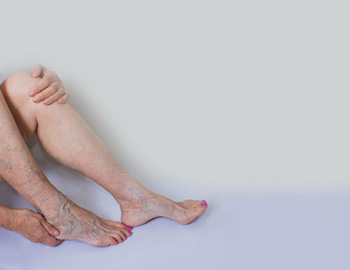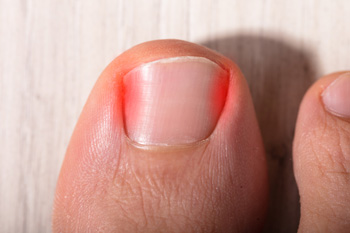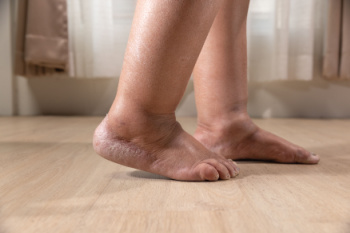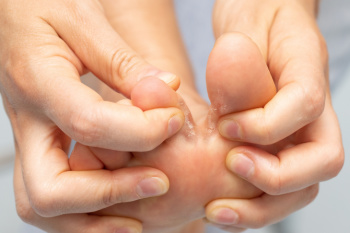Connect With Us
Blog
Items filtered by date: September 2025
Possible Symptoms of Neuropathy
 The peripheral nervous system is responsible for sending signals between parts of the body and the central nervous system. If it becomes damaged due to medical conditions such as diabetes, neuropathy may gradually develop. Symptoms include muscle weakness, numbing or tingling sensations, and the feet may feel cold. Other causes of this ailment may include narrowing of the arteries which can happen from smoking, existing autoimmune diseases, or hormonal imbalances. This condition can cause the inability to feel cuts, bruises, or wounds on the feet, which may become infected if left untreated. If you have any of these symptoms, it is suggested that you schedule a consultation with a podiatrist who can help you manage neuropathy.
The peripheral nervous system is responsible for sending signals between parts of the body and the central nervous system. If it becomes damaged due to medical conditions such as diabetes, neuropathy may gradually develop. Symptoms include muscle weakness, numbing or tingling sensations, and the feet may feel cold. Other causes of this ailment may include narrowing of the arteries which can happen from smoking, existing autoimmune diseases, or hormonal imbalances. This condition can cause the inability to feel cuts, bruises, or wounds on the feet, which may become infected if left untreated. If you have any of these symptoms, it is suggested that you schedule a consultation with a podiatrist who can help you manage neuropathy.
Neuropathy
Neuropathy can be a potentially serious condition, especially if it is left undiagnosed. If you have any concerns that you may be experiencing nerve loss in your feet, consult with Emil Babayev, DPM from New York. Our doctor will assess your condition and provide you with quality foot and ankle treatment for neuropathy.
What Is Neuropathy?
Neuropathy is a condition that leads to damage to the nerves in the body. Peripheral neuropathy, or neuropathy that affects your peripheral nervous system, usually occurs in the feet. Neuropathy can be triggered by a number of different causes. Such causes include diabetes, infections, cancers, disorders, and toxic substances.
Symptoms of Neuropathy Include:
- Numbness
- Sensation loss
- Prickling and tingling sensations
- Throbbing, freezing, burning pains
- Muscle weakness
Those with diabetes are at serious risk due to being unable to feel an ulcer on their feet. Diabetics usually also suffer from poor blood circulation. This can lead to the wound not healing, infections occurring, and the limb may have to be amputated.
Treatment
To treat neuropathy in the foot, podiatrists will first diagnose the cause of the neuropathy. Figuring out the underlying cause of the neuropathy will allow the podiatrist to prescribe the best treatment, whether it be caused by diabetes, toxic substance exposure, infection, etc. If the nerve has not died, then it’s possible that sensation may be able to return to the foot.
Pain medication may be issued for pain. Electrical nerve stimulation can be used to stimulate nerves. If the neuropathy is caused from pressure on the nerves, then surgery may be necessary.
If you have any questions, please feel free to contact our offices located in Midwood and Kensington in Brooklyn, NY . We offer the newest diagnostic and treatment technologies for all your foot care needs.
Children’s Walking Patterns

Walking irregularities in children, such as in-toeing, out-toeing, limping, and toe-walking, are fairly common and can result from various developmental factors. These patterns may develop due to natural variations in bone structure as a child grows, such as hip rotation or curved shin bones. Some children may have flat feet, loose ligaments, or muscle imbalances that contribute to unusual walking styles. Genetics, birth conditions, and early habits, like prolonged toe-walking, can also play a role. Many of these irregular walking patterns resolve as children grow and their bones and muscles strengthen. However, if your child experiences pain, frequent tripping, or if the issue persists beyond early childhood, it is suggested that a podiatrist be contacted for an evaluation. Treatment may include stretching exercises or custom orthotics to encourage normal walking patterns, and prevent long-term issues with balance and mobility.
Making sure that your children maintain good foot health is very important as they grow. If you have any questions, contact Emil Babayev, DPM of New York. Our doctor can provide the care you need to keep you pain-free and on your feet.
Keeping Children's Feet Healthy
Having healthy feet during childhood can help prevent medical problems later in life, namely in the back and legs. As children grow, their feet require different types of care. Here are some things to consider...
Although babies do not walk yet, it is still very important to take care of their feet.
Avoid putting tight shoes or socks on his or her feet.
Allow the baby to stretch and kick his or her feet to feel comfortable.
As a toddler, kids are now on the move and begin to develop differently. At this age, toddlers are getting a feel for walking, so don’t be alarmed if your toddler is unsteady or ‘walks funny’.
As your child gets older, it is important to teach them how to take care of their feet.
Show them proper hygiene to prevent infections such as fungus.
Be watchful for any pain or injury.
Have all injuries checked by a doctor as soon as possible.
Comfortable, protective shoes should always be worn, especially at play.
If you have any questions, please feel free to contact our offices located in Midwood and Kensington in Brooklyn, NY . We offer the newest diagnostic and treatment technologies for all your foot care needs.
What Causes an Ingrown Toenail?

Ingrown toenails develop when the corner or edge of a toenail grows into the skin beside it, most often affecting the big toe. Several factors can contribute to the formation of ingrown toenails. Trimming toenails too short or curving them at the edges can direct the nail into the skin. Naturally curved or thickened nails may also increase the risk. Shoes that are too tight or narrow can compress the toes and force the nail edges downward. Repeated toe injuries, such as stubbing or dropping a heavy object on it, also may trigger the problem. Additionally, sweaty feet and prolonged athletic activities, especially sports that involve kicking or pressure on the toes, can make ingrown toenails more likely. When left untreated, pain, swelling, and infection can occur. A podiatrist can evaluate the severity of the ingrown toenail and provide treatment, which may include nail correction or surgery, if necessary. If you are experiencing pain around your toenails, it is suggested that you schedule an appointment with a podiatrist for an evaluation and appropriate treatment.
Ingrown toenails may initially present themselves as a minor discomfort, but they may progress into an infection in the skin without proper treatment. For more information about ingrown toenails, contact Emil Babayev, DPM of New York. Our doctor can provide the care you need to keep you pain-free and on your feet.
Ingrown Toenails
Ingrown toenails are caused when the corner or side of a toenail grows into the soft flesh surrounding it. They often result in redness, swelling, pain, and in some cases, infection. This condition typically affects the big toe and may recur if it is not treated properly.
Causes
- Improper toenail trimming
- Genetics
- Improper shoe fitting
- Injury from pedicures or nail picking
- Abnormal gait
- Poor hygiene
You are more likely to develop an ingrown toenail if you are obese, have diabetes, arthritis, or have any fungal infection in your nails. Additionally, people who have foot or toe deformities are at a higher risk of developing an ingrown toenail.
Symptoms
Some symptoms of ingrown toenails are redness, swelling, and pain. In rare cases, there may be a yellowish drainage coming from the nail.
Treatment
Ignoring an ingrown toenail can have serious complications. Infections of the nail border can progress to a deeper soft-tissue infection, which can then turn into a bone infection. You should always speak with your podiatrist if you suspect you have an ingrown toenail, especially if you have diabetes or poor circulation.
If you have any questions, please feel free to contact our offices located in Midwood and Kensington in Brooklyn, NY . We offer the newest diagnostic and treatment technologies for all your foot care needs.
Wounds That Don't Heal Need to Be Checked
Causes and Treatment of Swollen Feet and Ankles

Swollen feet, also known as edema, occur when excess fluid builds up in the tissues of the feet and ankles. This often happens after long periods of standing or sitting, especially in warm weather, when gravity causes fluid to pool in the lower extremities. Wearing shoes that lack adequate support, such as flip-flops, may also contribute to swelling by failing to help the foot muscles and veins return fluid upward. Age can increase the risk because weakened veins have more difficulty moving blood against gravity. Other possible causes of swollen feet and ankles include high salt intake, pregnancy-related changes, or certain health conditions that affect circulation. Swelling may cause the skin on the feet and ankles to appear stretched and shiny, and, in some cases, pressing on the area may leave a noticeable indentation. A podiatrist can evaluate the underlying cause, provide treatment options, and recommend whether additional care is needed. If you are experiencing swelling in your feet and ankles, it is suggested that you schedule an appointment with a podiatrist for an accurate diagnose and appropriate treatment.
Swollen feet can be a sign of an underlying condition. If you have any concerns, contact Emil Babayev, DPM of New York. Our doctor can provide the care you need to keep you pain-free and on your feet.
Swollen feet are a common ailment among pregnant women and people who stand or sit for extended periods. Aging may increase the possibility of swollen feet and patients who are obese often notice when their feet are swelling too. There may be medical reasons why swollen feet occur:
- Phlebitis - A condition that causes the veins to become inflamed and can also cause leg pain.
- Liver disease - This may lead to low blood levels of albumin which is a protein. This can cause fluid in the blood to pass into the tissues and several areas of the body can become swollen.
- Heart failure - When the heart doesn’t pump properly the blood that is normally pumped back to the heart can pool in the veins of the legs causing swollen feet.
- Kidney disease - One of the main functions of the kidneys is releasing excess fluid in the body. This type of condition can make it difficult for the kidneys to function properly, and as a result the feet may become swollen.
- Deep-vein thrombosis (DVT)- This is a serious condition where blood clots form in the veins of the legs. They can block the return of blood from the legs to the heart which may cause the feet to swell. It is important to be treated by a podiatrist if this condition is present.
Swollen feet can also be caused by bone and tendon conditions, including fractures, arthritis, and tendinitis. Additionally, there may be skin and toenail conditions and an infection may cause the feet to swell. Patients who take medicine to treat high blood pressure may be prone to getting swollen feet.
Many patients elevate their feet to help relieve the swelling and this is generally a temporary remedy. When a podiatrist is consulted the reason behind the swelling can be uncovered and subsequently treated.
If you have any questions please contact our offices located in Midwood and Kensington in Brooklyn, NY . We offer the newest diagnostic and treatment technologies for all your foot and ankle needs.
Understanding Athlete’s Foot and Relief Tips

Athlete’s foot is a fungal infection that affects the skin of the feet, often developing between the toes. It thrives in warm and moist environments, making locker rooms, around pools, and tight footwear common sources of exposure. Symptoms include itching, burning, redness, peeling skin, and sometimes blisters or cracked areas that can become painful. Risk factors include excessive sweating, walking barefoot in public places, or wearing shoes that do not allow the feet to breathe. A podiatrist can diagnose the condition, provide effective anti-fungal treatments, and recommend prevention strategies to keep feet healthy. If you are experiencing signs of athlete’s foot, it is suggested that you consult a podiatrist who can provide effective treatment solutions, which may include prescribed medication.
Athlete’s foot is an inconvenient condition that can be easily reduced with the proper treatment. If you have any concerns about your feet and ankles, contact Emil Babayev, DPM from New York. Our doctor will treat your foot and ankle needs.
Athlete’s Foot: The Sole Story
Athlete's foot, also known as tinea pedis, can be an extremely contagious foot infection. It is commonly contracted in public changing areas and bathrooms, dormitory style living quarters, around locker rooms and public swimming pools, or anywhere your feet often come into contact with other people.
Solutions to Combat Athlete’s Foot
- Hydrate your feet by using lotion
- Exfoliate
- Buff off nails
- Use of anti-fungal products
- Examine your feet and visit your doctor if any suspicious blisters or cuts develop
Athlete’s foot can cause many irritating symptoms such as dry and flaking skin, itching, and redness. Some more severe symptoms can include bleeding and cracked skin, intense itching and burning, and even pain when walking. In the worst cases, Athlete’s foot can cause blistering as well. Speak to your podiatrist for a better understanding of the different causes of Athlete’s foot, as well as help in determining which treatment options are best for you.
If you have any questions please feel free to contact our offices located in Midwood and Kensington in Brooklyn, NY . We offer the newest diagnostic and treatment technologies for all your foot and ankle needs.

